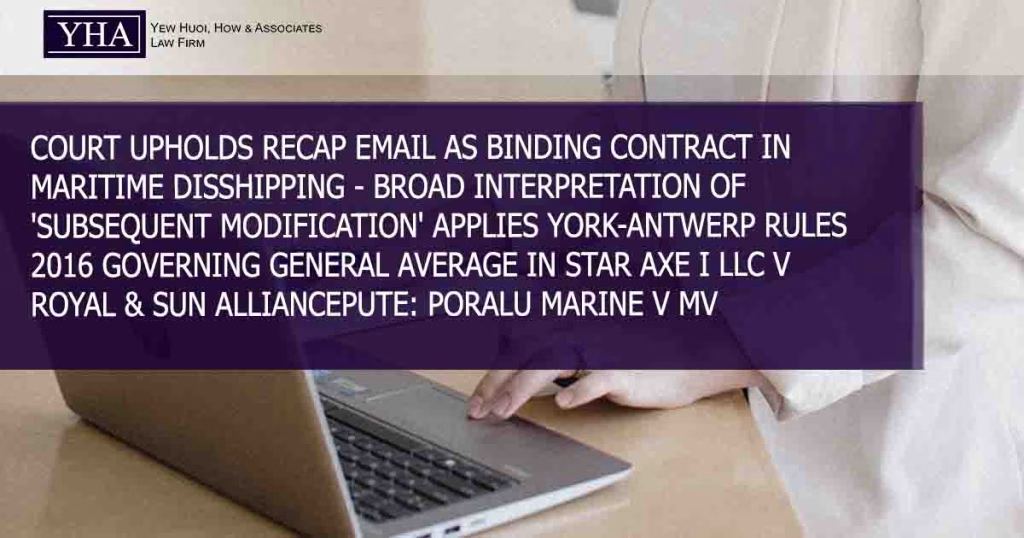Summary and Facts
The case Star Axe I LLC v Royal and Sun Alliance Luxembourg SA [2024] 1 Lloyd’s Rep 342 revolves around a dispute concerning general average adjustments under a series of Congenbill 1994 bills of lading. Star Axe I LLC, the carrier, issued seven bills of lading for cargo on the vessel M/V Star Antares. After an incident on 3.11.2021, in which the vessel struck a submerged object, general average was declared. The cargo insurers, Royal and Sun Alliance Luxembourg SA, issued average guarantees but contested whether the applicable York-Antwerp Rules (YAR) governing the general average should be the 1994 or 2016 version.
The bills of lading contained a clause specifying that general average was to be adjusted according to the York-Antwerp Rules 1994 or any subsequent modification thereof. The main issue before the court was whether the term “subsequent modification” included the YAR 2016 or whether only the YAR 1994 applied.
What is General Average?
- General average is a principle in maritime law that requires all parties involved in a sea voyage (shipowners, cargo owners, and insurers) to proportionally share the costs of any sacrifice or expenditure deliberately made for the safety of the vessel and its cargo. For example, if cargo is jettisoned or expenses are incurred to save a vessel during an emergency, the cost of these actions is shared by all parties with an interest in the voyage, rather than falling solely on the party that suffered the loss.
- The York-Antwerp Rules (YAR) govern how general average is calculated and distributed, providing internationally accepted guidelines on which expenses and losses qualify as general average. Over time, these rules have been updated, with the YAR 1994, YAR 2004, and YAR 2016 being some of the most commonly referenced versions.
Key Issue
The key legal question was whether the phrase “any subsequent modification” in the bills of lading included the YAR 2016, or whether this referred only to modifications strictly amending the YAR 1994.
Court’s Findings
- The court ruled in favour of the defendants, determining that the YAR 2016 were applicable.
- The court found that the words “any subsequent modification” reasonably encompassed new versions of the York-Antwerp Rules, including YAR 2016. A reasonable person in the shipping industry would interpret “modification” broadly, not limiting it to narrow textual amendments of YAR 1994 but including newer sets of rules promulgated to reflect modern shipping practices.
- The claimant’s argument, based on trade materials and commentaries suggesting that YAR 2004 and YAR 2016 were entirely new sets of rules rather than modifications, was rejected. The court held that these materials did not amount to an established market understanding that could override the plain meaning of the words.
How the YAR 2016 Impacted the Case
- The application of the YAR 2016 had a significant impact on the case due to changes in how general average adjustments are calculated under these rules. Compared to the YAR 1994, the YAR 2016 introduced modernized provisions, including:
- The YAR 2016 provides more clarity on how salvage is treated, particularly in the context of situations where multiple parties are involved. This affects how salvage costs are shared and the speed of general average settlements.
- The YAR 2016 also made amendments regarding the treatment of costs for handling cargo at ports of refuge, clarifying when such costs are considered general average. These rules can lead to a broader range of expenses qualifying for general average contributions, which can be significant for both the carrier and cargo interests.
- Under YAR 2016, allowances for certain port-related expenses are reduced, affecting how much the carrier could claim from the cargo interests for expenses incurred during the incident.
Had the YAR 1994 been applied, the carrier may have been entitled to claim a broader range of port-related expenses and possibly salvage claims. The court’s decision to apply YAR 2016 thus potentially reduced the overall liability of the cargo insurers, affecting the general average contributions they were required to make.
Practical Implications
- This ruling emphasizes that phrases like “any subsequent modification” in shipping contracts may be interpreted broadly to include entirely new versions of rules or regulations, not just minor amendments.
- Parties involved in shipping contracts should be aware that adopting wording like “any subsequent modification” in relation to York-Antwerp Rules can lead to the incorporation of the most recent version of the rules, which may differ significantly from earlier ones, as in this case with the YAR 2016.
- This case highlights the importance of clear contract drafting. If parties intend to restrict general average adjustments to a specific version of the YAR, they should explicitly state so, rather than relying on ambiguous wording like “subsequent modification.”
Conclusion
The court ruled that the YAR 2016 applied to the general average adjustments in this case, emphasizing that terms like “subsequent modification” should be interpreted broadly unless there is clear evidence to suggest a narrower meaning. The application of the YAR 2016 impacted the calculation of general average contributions, potentially reducing the liability of the cargo insurers. This decision provides clarity for the shipping industry regarding the application of the York-Antwerp Rules in general average disputes.

